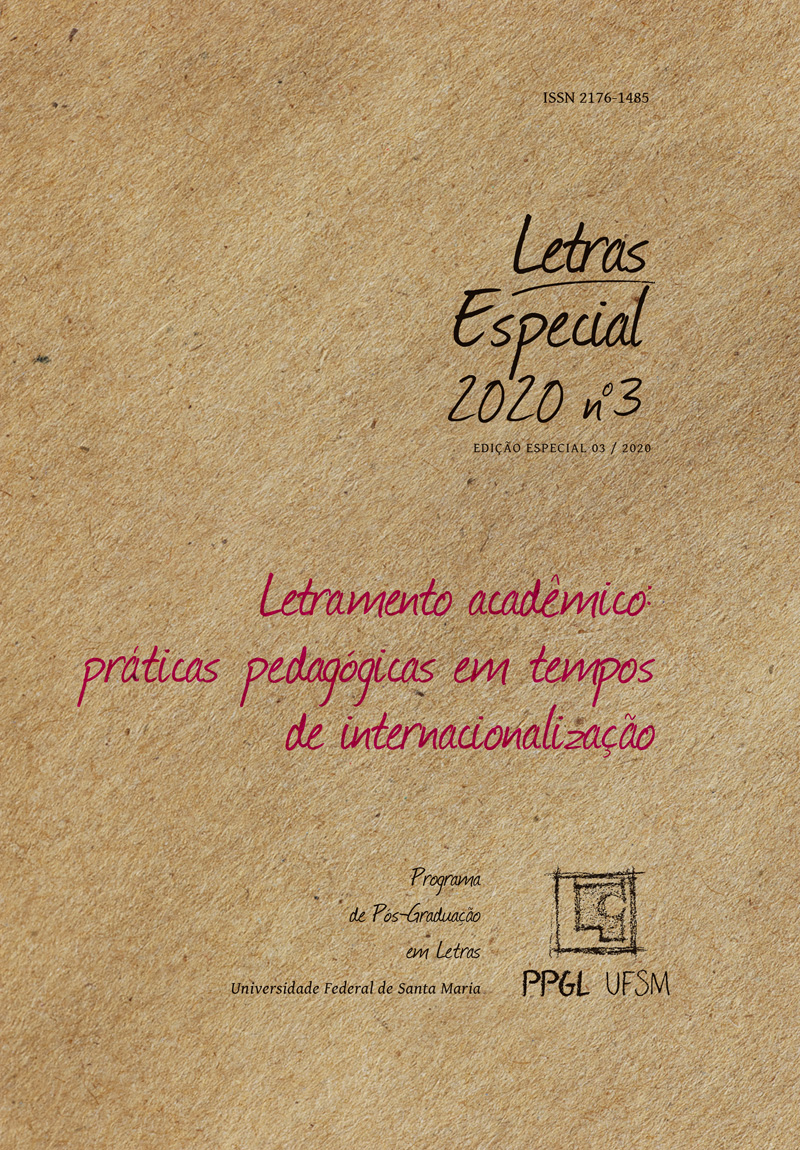Enhancing Academic Literacies Through emi training: three perspectives on teaching towards the certificate in emi skills at the University of São Paulo
DOI:
https://doi.org/10.5902/2176148543019Resumo
Developing the knowledge and the skill to master academic writing in higher education constitutes a challenge for most undergraduate students. However, learning about this genre in time of internationalization opens students´ doors to the wide world of academia. Thus, some undergraduate students were invited to become members of a Writing Feedback Center in which they worked with a tutor and a self-assessment sheet on different writing assignments following a process approach to writing. In this work we analyzed students’ and tutors’ perceptions on self-assessment in relation to the development of their academic skill.
Downloads
Referências
Andrade, H. & Valtcheva, A. (2009). Promoting Learning and Achievement Through
Self-Assessment. Theory Into Practice. 48. 12-19. 10.1080/00405840802577544.
Boud, D. (1991). Implementing Student Self-Assessment. HERDSA Green Guide. Second
Edition. Sydney: HERDSA.
Brown, G. T. L. (2004). Teachers’ Conceptions of Assessment: Implications for Policy and
Professional Development. Assessment in Education: Principles, Policy & Practice, 11 (3), 301-318.
Carlino, P. (2006) Concepciones y formas de enseñar escritura académica. Un estudio
contrastivo. Signo & Seña 16, 71- 117. Facultad de Filosofía y Letras: Universidad de Buenos Aires. ISSN: 0327 – 8956.
Chappuis, Stephen & Chappuis, J. (2008). The Best Value in Formative Assessment.
Educational Leadership, 65 (4), 14-19.
Davies, M. (2000). The role of the amygdala in conditioned and unconditioned fear and
anxiety. In J. P. Aggleton (Ed.). The Amygdala: A functional analysis (2nd ed., pp 213-228). Oxford, UK: Oxford University Press.
Dörnyei, Z. (2007) Research Methods in Applied Linguistics. Quantitative, Qualitative and
Mixed Methodologies. UK: Oxford University Press.
Dunning, D., Heath, C., & Suls, J. M. (2004). Flawed Self-Assessment: Implications for
Health, Education, and the Workplace. Psychological Science in the Public Interest, 5(3), 69–106. https://doi.org/10.1111/j.1529-1006.2004.00018.x
Fitzmaurice, M., & O’Farrell, C. (2014). Developing your academic writing skills: A
handbook. Retrieved from https://www.tcd.ie/CAPSL/readysteadywrite/AcademicWritingHandbook.pdf
Gonzalez, M. & Romano, M. (2018). Writing Feedback Center. Facultad de Lenguas: UNC.
Hyland, K. (2003) Genre- based pedagogies: A social response to process. Journal of Second
Language Writing, 12 (1), 17- 29.
Hyland, K. (2007) Genre and second language writing. In D. Belcher & Jun Liu (Eds.),
Michigan Series on Teaching Multilingual Writers. Michigan: The University of Michigan Press.
Joyce, Weil & Calhoun (2009). Models of Teaching. 8th Edition. Pearson
Mackey, A., & Gass, S. M. (2005). Second language research: Methodology and design.
Lawrence Erlbaum Associates Publishers.
Martin & Rose D. (2003). Working with discourse: meaning beyond the clause. London:
Continuum [2nd Revised Edition 2007].
Martinez, J. I. & Romano, M. E. (2019) Handout of Reading Material and Writing Practice.
Facultad de Lenguas: FL Copias de Natalia Rondini.
Stake, R. (1995). The art of case study research. Thousand Oaks, CA: Sage.
Oxford, R. (2017). Teaching and Researching Language Learning Strategies: Self-regulation
in Context. Applied linguistics in action. Routledge, Taylor & Francis Group. ISBN
, 9781138856790
Stiggins, R. J., & Chappuis, J. (2006). What a difference a word makes: Assessment FOR
learning rather than assessment OF learning helps students succeed. Journal of Staff
Development, 27(1), 10–14.
Stiggins, Richard J. (2002). Assessment Crisis: The Absence of Assessment for Learning. Phi
Delta Kappan, 83 (10), 758-765. Disponible en:
http://www.electronicportfolios.org/afl/Stiggins-AssessmentCrisis.pdf
Downloads
Publicado
Versões
- 2023-05-12 (4)
- 2022-07-26 (3)
- 2022-07-04 (2)
- 2021-10-19 (1)
Como Citar
Edição
Seção
Licença
Copyright (c) 2021 Letras

Este trabalho está licenciado sob uma licença Creative Commons Attribution-NonCommercial-ShareAlike 4.0 International License.
Ficam concedidos a Letras todos os direitos autorais referentes aos trabalhos publicados. Os originais não devem ter sido publicados ou submetidos simultaneamente a outro periódico e não serão devolvidos. Em virtude de aparecerem nesta revista de acesso público, os artigos são de uso gratuito, com atribuições próprias, em aplicações educacionais e não comerciais.






